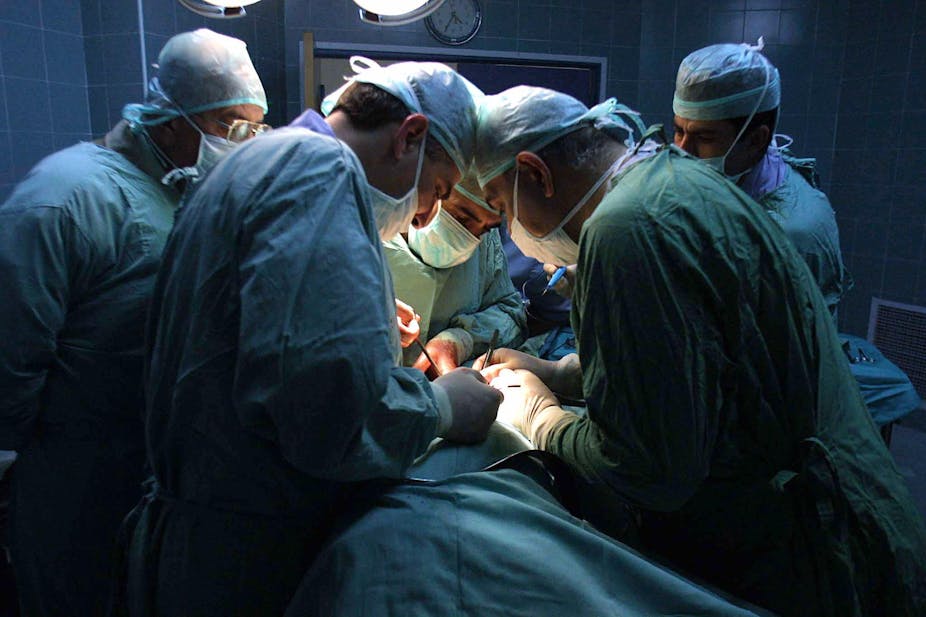What are we to make of reports this week that police are investigating a case of a young woman trafficked from the Philippines so a Sydney woman on an organ donation waiting list could have her kidney?
Certainly it speaks to the desperation of people who are on waiting lists for organ donation. But even though the process of being placed on a such a waiting list is arduous and emotionally fraught, the system for allocating donor organs is ethical, just and must be respected.
Few people in the community have insight into the personal pressures transplant recipients are under as they balance the stress and trauma of a life-threatening illness with the expectations they carry when exposed to society’s scrutiny for receiving this “gift”.
The rigorous process preceding joining an organ donation waiting list means people often die before the assessments are complete and this adds to their desperation.
The long road
It all starts with a general practitioner undertaking an analysis of a patient’s health. This is the first of the many screenings that the patient will have to go through.
Sometimes this visit ends with health advice about lifestyle changes but in other instances, it ends with a referral to a medical specialist with expertise in the failing organ, such as the kidney, heart or lung.
If the specialist believes that the patient would benefit from a transplant, then they are referred to the nearest transplant centre. These are only located in some state capitals and sometimes patients decide not to go.
This decision often results from either the prohibitive distance the patient has to travel or the invasive tests required before their name can be added to the waiting list to fear of having a transplant.
These invasive tests provide a rigorous assessment of whether the patient would benefit from an organ transplant.
The tests involve weighing the following considerations:
whether the transplant is going to help;
whether the patient will be able to care for themself;
if the patient can cope with continuing treatment and ensuing responsibilities;
if the recipient is likely to squander their chance.
Lifestyle activities are reviewed and factors that could interfere with transplant success identified. These include the use of tobacco, alcohol, illicit drugs and the patient’s body weight.
Some patients decline to be placed on a waiting list when they’re informed of their assessment outcome by their specialist. Their reasons are varied but often the idea of having someone else’s organ in their body and fear of the risk of surgery play key roles.
Sometimes those who decide against being placed on a waiting list initially change their minds and revisit their decision as their health declines.
Others may be too ill to be considered, as their doctors recognize that their deteriorating health means the patient will likely die at the time of transplant or shortly afterwards.
When a recipient gets news that an organ is available, timeframes are tight and decisions are made quickly.
In the complex of emotions being experienced by recipients is the awareness that someone has just died and a family is grieving. Recipients often speak of how they struggle with the knowledge that others’ grieving has resulted in hope for them.
Hospitals provide expert care for deceased donors and their families.
Those faced with chronic illness, impending death, risks of complex surgery and the challenges that accompany their “gift of life” have travelled a challenging path and deserve our support in honouring the legacy of the donor.
Post-transplant
The patient-doctor relationship is legally and ethically protected and therapeutic decisions are confidential, so informed public discussion about the responsibilities transplant patients undertake to maintain their health prior to receiving an organ transplant is limited.
An anonymous transplant recipient once described his initial shock about the content of the agreement he had to make with his doctor before being placed on the transplant waiting list:
“I was so angry when I realised what he was saying … I would have to agree that my body would belong to him; and that I would have to do everything he told me to do (in caring for my transplant) for the rest of my life.”
So even if it appears that there’s no punitive measure against an “underserving” organ recipient who, for instance, could have a liver transplanted and subsequently refuse to stop drinking, this behaviour will affect chances of survival.
Organ donation governance
In Australia, organ donation is an altruistic gift, given without expectation of reward: families agree to donate organs without any knowledge of who the recipient is likely to be.
Legal requirements for confidentiality protect the identity and interests of all involved.
It is illegal to trade in organs or tissue in Australia as the country is a signatory to an international convention against organ trade – The Declaration of Istanbul on Organ Trafficking and Transplant Tourism.
The whole process is governed by a strong framework of ethical principles, that provide recommendations for ethical practice in organ and tissue donation and transplantation.
Underpinning this is a robust legal framework that serves to protect the best interests of the community, including potential donors, their family and recipients
Find out more about organ donation or register on the Australian Organ Donor Register.

